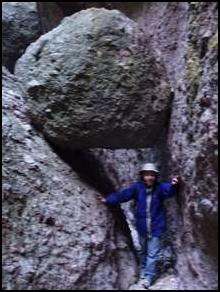The Gropenfuhrer
Doonesbury has been having a field day with the Schwarzenegger election. This one was particularly funny.
Doonesbury has been having a field day with the Schwarzenegger election. This one was particularly funny.
If you’re reading this, and you live in San Francisco, I’m betting you’re more likely than not a Matt Gonzalez· supporter. While I’m usually not too excited about electoral politics, this is a unique case. This matters.
The December 9 mayoral election will be won or lost on registration and turn-out. A lot of people are repeating this message, but let me add my voice to the choir.
Register· before the end of Monday, November 24. You can even do it online·. Then vote either absentee or on election day, December 9.
Eugene Volokh· presents a hypothetical “alcohol manufacturers lawsuit”· in which alcohol manufacturers are accused of “knowingly participat[ing] in and facilitat[ing] the secondary market where persons who are illegal purchasers . . . . obtain their alcohol.” Volokh suggests that imposing a heavy burden on manufacturers to prevent retailers from selling alcohol to people who will pass it on to minors is absurd, but that this is nearly exactly the same logic used in a recent Ninth Circuit decision involving firearm manufacturers.
My immediate reaction is that guns and alcohol are sufficiently different sorts of things that the parallelism doesn’t hold. Volokh does note that alcohol “causes” three times more deaths than guns, but I don’t think raw numbers of fatalities is the issue here. I think it’s reasonable to impose substantial duties on the entire supply chain of firearms, from the manufacturers all the way to the final purchasers. That we impose less substantial duties on the alcohol supply chain is not inconsistent: it’s a policy judgment that takes place both in the legislature and in the courts. Even if alcohol is more “dangerous” in some sense, it might be the case that: (1) we, as a society, feel that there are also more benefits associated with alcohol than with guns, and thus are more willing to tolerate the costs; (2) alcohol might just be much more costly to police (e.g., the failure of prohibition); (3) firearms affect more “innocent” third-parties than does alcohol (this might be refuted statistically); (4) perhaps the only reason there are more fatalities associated with alcohol than with firearms is because we’ve imposed substantial regulations—there’s no possible “state of nature” possible comparison between firearms and alcohol.
It’s a common rhetorical device to show how this sort of substitution gives an absurd result, but I don’t think the argument is compelling in this example. I don’t believe there is a “slippery slope” argument that attaching these sorts of duties to gun manufacturers is likely to spill over to other industries. I think it’s enough to say that commonly held social values put firearms in a different place than other items, and argument that seems silly when applied to alcohol (or, for example, pencils, which also cause a certain number of injuries) is not absurd in the context of guns.
 |
 |
I took lots of photos on my trip to the Pinnacles·, but I don’t think it’s possible to capture the magnitude of these rocks and caves, at least not with my cheap and obsolete digital camera. Here’s me under a giant boulder that gradually settled into this canyon as it was chisseled away by flowing water, and a view of the rock formations on high. The pinnacles were formed by a volcanic eruption millions of years ago. The peaks were originally three times as tall and spanned a major fault line between the Pacific and North American tectonic plates; now half of the mountains have moved down near Los Angeles and the other half are in the bay area.
For my local California readers, here are a few things I’ll be doing in my last few days here, please join me!
Modern Times Bookstore is having an Indie Press Party to celebrate the release of McSweeney’s Issue 12. The event will feature readings by an array of writers from Issue 12, including Julie Orringer, Ben Ehrenreich, Shann Ray, Salvador Plascencia. Additionally, because McSweeney’s is the Independent Press of the Month, all McSweeney’s titles will be 25% off at Modern Times during the month of November.
Thursday, November 20
SAN FRANCISCO
Indie Press Party for McSweeney’s Issue #12
Modern Times Bookstore
888 Valencia Street at 20th Street
Ph: (415) 282-9246
7-9 p.m.
CNN Money· reports the following headline· today:
Indeed. (as always, more background on the SCO lawsuit is available·).
Cardea· looks like a really cool invention. It’s a three-armed robot with a Segway Human Transporter· for a foot. It’s an MIT AI Lab project·—see the Project Page·. I mention it here—(1) because it looks pretty nifty, but (2) it’s a good reminder of the innovation that occurs in academic institutions, where — arguably — the typical intellectual property ownership incentive to create is at least limited. I’m wondering if the device is ever released whether there will be patent problems—will Cardea have to license the Segway from Dean Kamen·?
Incidentally, the Dean Kamen info page includes this clever little Q & A:
How do I contact Dean Kamen directly?
Unfortunately you cannot contact Dean directly.
(this entry also marks the birth of a new weblog topic, technology)
I attended a Matt Gonzalez for Mayor· party tonight, one of 100 such parties happening in 30 days·. Although Matt wasn’t there, I was struck by the energy and enthusiasm of the volunteers and attendees. Several independent artists and publishers spoke, and some who had little income and had never given money to any candidate said they were giving the maximum amount permitted under law this time. The Indymedia· founder spoke about Matt’s commitment to the public interest in media and communications issues, including the upcoming renewal of the cable franchise for San Francisco.
I was impressed with Gonzalez when I saw him riding on the Critical Mass ride here a couple of weeks ago. I also recently noticed he has a profile in Friendster· (account required), with lots of friends. I was wondering if the Friendster profile was for real, so I googled for “Matt Gonzalez” Friendster and to my surprise got my own weblog back as the top hit.
In any case, it appears the Friendster profile is for real, at least according to Bloggers for Matt·.
So Matt gets my vote. It’s been a long time since a major American city had a truly progressive mayor. This may be our best shot yet. Sign me for Bloggers for Matt.
Update: see also the counter-propaganda brigade· for some clever Newsom counter-ads.
Last week, I wrote about a poorly written slightly satirical article criticizing open source. Today, I received a response from a Princeton administrator, linking to an official Princeton position statement on open source·.
While the position paper does distance itself from Howard Strauss’ article, it unfortunately presents a false trichotomy of “open source” vs. “vendor” vs. “local development.” In fact, there are at least two entirely separate decisions to be made in software procurement:
Any entity is free to mix and match between these options. For example, it’s quite common to have vendor supported open source software (e.g., Red Hat Linux·), or to have some in house expertise and development on open source software. Or even to rely on some vendor support, some community support, and some in house support.
Of course, if you choose the proprietary solution, you’re likely locked into the “vendor support” model indefinitely, and have no choice about your vendor.
It’s also disappointing that the Princeton Position Paper didn’t touch on the historic role of the University in advancing the pursuit of knowledge, and how open source code comports with these principles, which have been observed in the scientific community since the beginning of time. (i.e., share freely your discoveries so that others may improve on them).